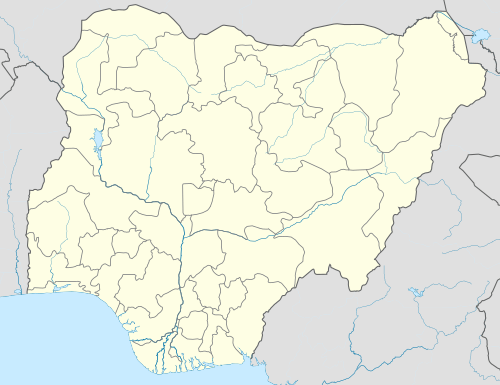Biu Emirate
The Biu Emirate is a traditional state based in Biu in Borno State, Nigeria. Prior to 1920 it was referred to as the Biu Kingdom. The current ruler is Maidalla Mustafa dan Aliyu(b. 1915) who became Mai Biu, also styled Kuthli, in 1959.[1]
Biu Emirate | |
|---|---|
traditional state | |
 Biu Emirate Biu shown within Nigeria | |
| Coordinates: 10.6111°N 12.195°E | |
| Country | |
| State | Borno State |
| Population | 176,072 (2,006) |
| Time zone | UTC+1 (CET) |
History
The rulers of Biu are numbered from Abdullahi, later known as Yamta-ra-Wala or Yamta the Great, who established his rule about 1535.[2] Around 1670, in the reign of Mari Watila Tampta, it became known as a kingdom.[3] The main ethnic group is the Babur/Bura people, related to the Kanuri people.[4] The founder was said to have come from elsewhere, captured the main town in the area, then founded a new capital in Dlimbur, which is now an archaeological site. His descendants formed two rival dynasties, one at Kogu and the other in nearby Mandaragirau.[5]
King Mari Watirwa (r. 1793–1838) of Kogu defeated Fulani invaders from the Gombe Emirate to the west. In 1878 Mari Biya, became the first Bura king to rule from Biu. The emir's palace is now situated in the town.[3] With British rule, Biu division was created in 1918. Mai Ari Dogo was acknowledged as the first emir of Biu in 1920. The area became known as the Biu federation after 1957, when the districts of Shani and Askira were added to the emirate.[3]
The Biu Emirate includes the Biu, Hawul, Kwaya Kusar and Bayo local government areas.[6] The Biu Emirate has by convention always produced the Deputy Governor of Borno State, representing the south of the state.[7] Until recently, the Biu Emirate was one of three in Borno State, the others being the Borno Emirate and the Dikwa Emirate.[6] In March 2010 the Borno State Governor Ali Modu Sheriff split the old Dikwa Emirate into the new Bama and Dikwa Emirates.[8] This triggered petitions from the people of Hawul, Kwaya Kusar and Bayo to also have separate chiefdoms, which the governor had stated he would do "if the need arises".[9]
Rulers
Mai Biu, also styled Kuthli, were:[1]
| Start | End | Ruler | Notes |
|---|---|---|---|
| c. 1740 | Mari Kopchi | aka Mari Kwabchi | |
| c. 1750 | Di Forma dan Mari Kopchi | son of Mari Kopchi | |
| c. 1760 | Garga Moda dan Mari Kopchi | brother of Di Forma | |
| c. 1770 | Dawi Moda (Di Moda dan Di Forma) | son of Di Forma | |
| c. 1780 | Di Biya dan Di Moda | son of Dawi Moda | |
| 1783 | Di Rawa dan Di Biya | son of Di Biya | |
| 1783 | 1793 | Garga Kopchi dan Di Biya (d. 1793) | brother of Di Rawa |
| 1793 | 1838 | Mari Watirwa dan Di Rawa (d. 1838) | son of Di Rawa |
| 1838 | 1873 | Ari Paskur dan Mari Watirwa (d. 1873) | son of Mari Watirwa |
| 1873 | 1891 | Mari Biya dan Ari Paskur (d. 1891) | son of Ari Paskur |
| 1891 | 1908 | Garga Kwomting dan Mari Biya (d. 1908) | son of Mari Biya |
| 1908 | 1920 | Ari I Dogo dan Garga Kwomting (b. 1876 - d. 1935) | son of Garga Kwomting |
Emirs were:[1]
| Start | End | Ruler | Notes |
|---|---|---|---|
| 1920 | 1935 | Ari I Dogo dan Garga Kwomting (see above) | |
| 1935 | 1951 | Ari II Gurgur dan Garga Kwomting (d. 1951) | brother of Ari I |
| 1951 | 1959 | Muhammad `Aliyu dan Ari Dogo (b. 1907) | son of Ari I |
| 1959 | 1989 | Maidalla Mustafa dan Muhammad Aliyu (b. 1915) | son of Muhammad `Aliyu District Head of Kwaya territory before his accession |
| June 1989 | Mai Umar Mustapha Aliyu | son of Maidalla Mustafa |
Local Government Areas in Biu Emirate
Biu Emirate covers four Local Government Areas:
References
- "Traditional States of Nigeria". World Statesmen.org. Retrieved 2010-09-20.
- Montgomery-Massingberd, Hugh (1980) "Biu" Burke's Royal Families of the World: Africa & the Middle East (Volume 2 of Burke's royal families of the world) Burke's Peerage, London, page 177, ISBN 0-85011-023-8
- "Biu (Nigeria)". Encyclopædia Britannica. Retrieved 2009-10-05.
- "People And Languages of Borno State". Borno State government. Retrieved 2010-09-20.
- Ronald Cohen, Judith Drick Toland (1988). State formation and political legitimacy, Volume 6: Political anthropology. Transaction Publishers. p. 73. ISBN 0-88738-161-8.
- "BORNO STATE". Online Nigeria Daily News. 2003-01-29. Retrieved 2010-09-20.
- Inuwa Bwala (11 July 2010). "Borno 2011 - How Power Will Shift". Leadership. Retrieved 2010-09-20.
- Abdulkareem Haruna (28 March 2010). "Kingmakers Crown New Shehu of Dikwa". Daily Independent. Retrieved 2010-09-20.
- Inuwa Bwala (20 March 2010). "Beyond the hype over new emirates in Borno". Sunday Trust. Archived from the original on 8 July 2011. Retrieved 2010-09-20.
- Nigeria (2000). Nigeria: a people united, a future assured. 2, State Surveys (Millennium ed.). Abuja, Nigeria: Federal Ministry of Information. p. 106. ISBN 9780104089.